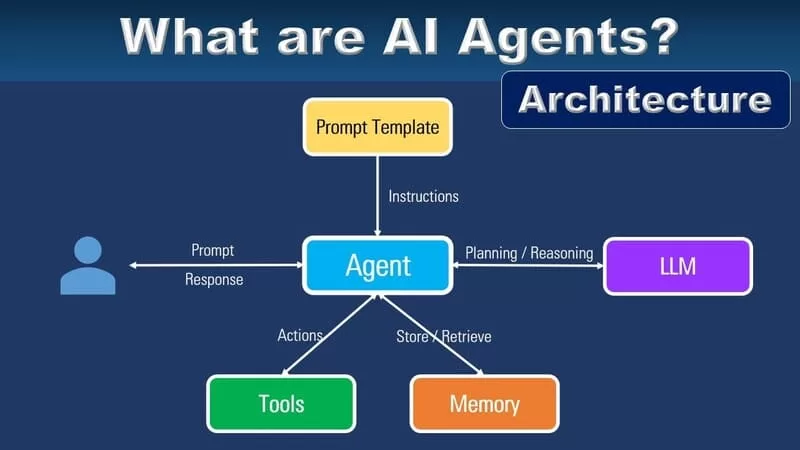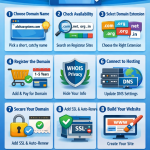What is an AI agent?
AI agents are software systems that use AI to achieve goals and complete tasks on behalf of users. They demonstrate reasoning, planning, and memory, and have a level of autonomy to make decisions, learn, and adapt.
Its capabilities are largely possible thanks to the multimodal capabilities of generative AI and basic AI models. AI agents can process multimodal information, such as text, voice, video, audio, code, and more, simultaneously; they can converse, reason, learn, and make decisions. They can learn over time and facilitate transactions and business processes. Agents can work with other agents to coordinate and perform more complex workflows.
Main functions of an AI agent
As explained above, although the key functions of an AI agent are reasoning and action (as described in the ReAct framework ), more functions have been developed over time.
- Reasoning: This basic cognitive process involves using logic and available information to draw conclusions, make inferences, and solve problems. AI agents with powerful reasoning capabilities can analyze data, identify patterns, and make informed decisions based on evidence and context.
- Action: The ability to take action or perform tasks based on decisions, plans, or external input is critical for AI agents to interact with their environment and achieve their goals. This can include physical actions, in the case of embodied AI, or digital actions such as sending messages, updating data, or triggering other processes.
- Observation: Gathering information about the environment or situation through perception or sensing is essential for AI agents to understand their context and make informed decisions. This can involve various forms of perception, such as computer vision, natural language processing, or sensor data analysis.
- Planning: Developing a strategic plan to achieve goals is a key aspect of intelligent behavior. AI agents with planning capabilities can identify necessary steps, evaluate possible actions, and choose the best course of action based on available information and desired outcomes. This typically involves anticipating future states and considering potential obstacles.
- Collaboration: Working effectively with others, whether humans or other AI agents, to achieve a common goal is increasingly important in complex and dynamic environments. Collaboration requires communication, coordination, and the ability to understand and respect the perspectives of others.
- Self-refinement: The ability to self-improve and adapt is a hallmark of advanced AI systems. AI agents with self-refinement capabilities can learn from experience, adjust their behavior based on the feedback they receive, and continuously improve their performance and functionality over time. This may involve machine learning techniques, optimization algorithms, or other forms of self-modification.
AI Agents vs. Agent AI: Understanding the Difference
The rapid evolution of artificial intelligence has given rise to a barrage of terms that are often confused, misused, or simply misunderstood. Among them are AI agents and agentic AI. These terms may seem similar, but they refer to fundamentally different approaches to automation and intelligence. While both are designed to act on behalf of users, the distinction lies in their autonomy, adaptability, and operational scope. Let’s break it down.
AI Agents: Task-Oriented Automation
AI agents are rules-based systems designed to execute specific tasks based on predefined inputs and goals. These agents operate within a controlled environment and often function as extensions of existing software or workflows. Think of them as AI-powered assistants that can handle automation but are ultimately limited by predefined rules and parameters.
For example:
- A chatbot that responds to customer queries based on predefined responses.
- An artificial intelligence-powered security system that detects abnormal behavior based on pre-established rules.
- A network automation tool that applies security patches according to predefined schedules.
AI agents don’t improve on their own beyond their training data and can’t dynamically adjust their behavior beyond their coded logic. They excel at efficiency, but lack the ability to make decisions beyond their programmed scope.
Agentic AI: Autonomy and Adaptive Decision-Making
Agentic AI takes automation a step further by introducing autonomy and contextual adaptation. Unlike AI agents, agentic AI is designed to perceive, reason, and act independently. It doesn’t simply follow instructions; it can dynamically determine the best course of action based on its environment.
Key features of the AI agent include:
- Self-learning capabilities, allowing you to improve over time.
- Situational awareness, allowing you to react to unexpected conditions.
- Goal-seeking behavior, which means you can redefine your own actions to optimize results.
For example:
- A cybersecurity AI that actively adjusts security rules in real time based on evolving attack patterns rather than following preset rules.
- An autonomous IT operations AI that detects inefficiencies in network configurations and applies optimizations without human intervention.
- An AI-powered application delivery system that dynamically reroutes traffic based on a predictive performance model.
Unlike traditional AI agents, agent AI doesn’t just react; it anticipates, adapts, and develops strategies. It goes beyond basic automation toward a more dynamic, problem-solving entity.
Why the difference matters
As businesses accelerate their adoption of AI-driven automation, it’s critical to understand the distinction between AI agents and agent AI. AI agents are ideal for repetitive, rule-based tasks that require predictability and control, while agent AI is better suited for environments that demand adaptability, resilience, and autonomous decision-making.
For organizations focused on network security, application delivery, and IT automation, the shift to agent AI represents a major leap forward. While AI agents help reduce human workload by handling predefined tasks, agent AI enables proactive, real-time decision-making that improves efficiency, security, and performance at scale.
The Future: A Hybrid Approach?
Rather than a binary choice, the future likely involves a hybrid approach (surprised?) where AI agents and agentic AI work together. AI agents handle predictable, repeatable tasks, while agentic AI dynamically adapts to emerging challenges and opportunities.
For organizations looking to scale automation beyond scripts and rules, understanding the differences between these AI models isn’t just an academic exercise; it’s a roadmap for the future of AIOps.






